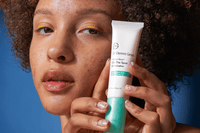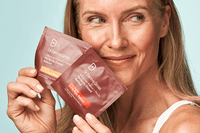Why Sleep is Important for Skin & How Lack of Sleep Affects It
7 minutes

It’s called “beauty rest” for a reason. While you’re asleep at night, peacefully dreaming about Squishmallows, your skin is working harder than Allan trying to get out of Barbie Land. But while all that effort may sound exhausting, it’s actually its own reward.
What your skin is doing while you’re asleep
Don’t be fooled by the calmness you see on the exterior: Deep inside, your skin cells are a flurry of activity.
Caution: Cells at work
Between the hours of 9 p.m. and midnight, cell division (aka mitosis) is at max levels. This is when cells are fixing whatever beating they took during the day: assault by UV rays, pummeling by pollution, humidity-induced sweat, dirt from daily living, and so on. While you’re tucked snugly in your bed, your skin cells finally get a moment to breathe (just a moment) and use that time to play catch up. One thing skin really likes to do when they get this chance? Make collagen.
Blood flow bonus
In order to fuel all this cellular construction during sleep, circulation increases to bring additional nutrients and energy to laboring cells. A pleasant side effect of this extra blood flow is glowing skin when you wake up.
Stress hormone down, sleep hormone up
Cortisol (otherwise known as the stress hormone) is a part of the daily lives of most people, but when it spikes frequently, it triggers more health issues just acne flare-ups — not to minimize those! But unless you spend the entire night dreaming of ways you could have answered questions differently in an important job interview, sleep is when your body can finally exhale.
Speaking of sleep, you’ll get an assist on your way to Zzz Town from your body’s secretion of the melatonin. The sleep hormone, an antioxidant (we love those!) signals to all systems that it’s time to go nighty-night.
Into thin air: The story of skin’s moisture
But while the day’s cares may be floating away into the darkness, so is the moisture in your skin. Even if you don’t “sleep hot,” your body still warms up during a sleep state, contributing to transepidermal water loss (TEWL). Another factor aiding moisture evaporation is that sebum production (yes, all skin types make it) has peaked in the middle of the day and been on the decline since. Say what you will about the body’s natural oil (and we know you have a lot of thoughts), you need at least some of it to help prevent TEWL.
How skin reacts to a lack of quality sleep
If your body doesn’t have enough time and resources (in the form of you in deep-sleep mode), it’s forced to triage the work it can do during the night. It’s going to prioritize the cellular repairs it makes (not all the cells that need patched up after a hectic day are the skin kind; your body also needs to allocate resources to address the effect stress from that job interview had on your stomach cells, for example). Some of the impacts on your complexion are immediately apparent as soon as you open your eyes — the converse of increased blood flow means dull, lackluster skin when you wake up. But if your skin can’t repair free radical damage daily and make more collagen, you’re going to see those impacts over time, in the form of discoloration, sagging skin, and increased fine lines.
How do you boost skin repair during sleep?
Start by helping your body help you. Endeavor to set a sleep schedule and then stick to it. This can be everything from creating an optimal sleep environment (block out light — including the blue light from your phone — adjust the room temperature, give yourself enough time to wind down, etc.) to ensuring you get enough shut eye each night. (According to the American Academy of Sleep Medicine and the Sleep Society, adults need at least seven hours.)
Then give your skin tools to optimize the functions already taking place by building a nighttime skincare routine with all the essential ingredients. One bonus to the permeability that’s allowing moisture to escape while you snooze: Skin is also extremely receptive to the ingredients you apply to it, so take advantage!
Retinol
https://drdennisgross.com/blogs/skincare-blog/introducing-derminfusions-fill-and-repair-serumThe vitamin A derivative is a miracle worker that can do everything from stimulate collagen production to reduce the appearance of discoloration.
Find it in:
- Dr. Dennis Gross Advanced Retinol + Ferulic Overnight Texture Renewal Peel can be used up to three times a week for an extra boost to your regular retinol regimen, helping provide additional glow and collagen formation.
- Dr. Dennis Gross Advanced Retinol + Ferulic Texture Renewal Serum gently fades dark spots and fine lines while balancing sebum production.
- Dr. Dennis Gross Advanced Retinol + Ferulic Triple Correction Eye Serum helps minimize the look of crow’s feet and undereye darkness.
Niacinamide
Also known as vitamin B3, niacinamide helps reinforce skin’s barrier function. A stronger skin barrier means less opportunity for TEWL.
Find it in:
- Dr. Dennis Gross DermInfusions Fill + Repair Serum is rich in niacinamide, as well as moisture-attracting hyaluronic acid. Both work to help keep skin strong and hydrated. Oil free, DermInfusions Fill + Repair Serum can double as a moisturizer for those whose skin tends to be oily or as a layer under night cream for those with drier complexions. It is also loaded with ectoin – another moisture barrier enhancing ingredient.
Discover Dr. Dennis Gross Skincare for All Your Skincare Needs
For more skincare tips from the experts at Dr. Dennis Gross, check out our blog’s newest content today. Shop the collection of Dr. Dennis Gross bestselling skincare backed by dermatologists.
Written By
Ben Gentzler
Ben Gentzler ha trabajado en la industria de la belleza durante 17 años, 10 de los cuales se dedicaron al cuidado clínico de la piel. Es un esteticista licenciado apasionado por la educación profesional líder en tratamientos de vanguardia en los mejores spas de todo el mundo y por la formación en la ciencia de la piel. Ben se ha capacitado directamente con el Dr. Dennis Gross, aprendiendo sobre lo último en cuidado de la piel y trabajando con sus clientes para ayudarlos a lograr su mejor piel.
Read More from Ben Gentzler
Written By
Ben Gentzler
Ben Gentzler ha trabajado en la industria de la belleza durante 17 años, 10 de los cuales se dedicaron al cuidado clínico de la piel. Es un esteticista licenciado apasionado por la educación profesional líder en tratamientos de vanguardia en los mejores spas de todo el mundo y por la formación en la ciencia de la piel. Ben se ha capacitado directamente con el Dr. Dennis Gross, aprendiendo sobre lo último en cuidado de la piel y trabajando con sus clientes para ayudarlos a lograr su mejor piel.
Read More from Ben GentzlerRelated Articles
-

acne, author-ben-gentzler, skin-and-deeper April 03, 2024 — 6 minutes
Hit It: Introducing The Dr. Dennis Gross Alpha Beta On The Spot Eliminator
by Ben Gentzler
-

author-ben-gentzler, myth-busting, oily-skin, skin-and-deeper April 01, 2024 — 9 minutes
Myth busted: Yes, your oily skin does need a moisturizer
by Ben Gentzler
-

author-ben-gentzler, pro-tips, retinol, skin-and-deeper March 25, 2024 — 5 minutes
How to Use Perfectly Dosed Retinol Pads Like a Pro
by Ben Gentzler
Keep Reading
Mantente al día con los últimos consejos de nuestro equipo de expertos en cuidado de la piel.
Regístrese para recibir un resumen mensual de consejos para el cuidado de la piel, el bienestar y el estilo de vida.






